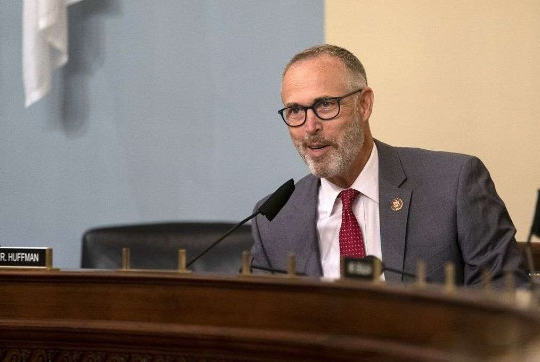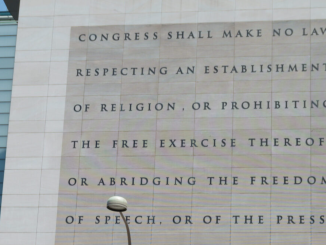
More and more elected officials in the U.S. disagree with the national motto “In God We Trust.”
The number of people who identify as atheists or humanists is increasing among members of state legislatures and in Congress, according to the Center for Freethought Equality, an advocacy group that supports the trend.
“We’re a sizable part of the population now, and representation is key. You want to see people like yourself in elected office, and also by having people in elected office, it helps remove that lingering bias against our community,” said Ron Millar, the group’s political coordinator.
“When we’re dealing with climate change and social issues, people are really looking for evidence-based public policy and sort of discarding the various beliefs that are put forward, especially by conservative, religious folks,” he said.
The Nov. 8 midterm elections marked strong gains for atheists and humanists. Humanists believe human beings evolved naturally rather than being created by God.
Before the 2016 elections, just five officials serving in state legislatures identified as humanists or atheists. When legislatures convene next year, that number will increase to 70.
Most humanist or atheist candidates won statehouse seats, but Rep.-elect Eric Sorensen, Illinois Democrat, scored a win for the group in Congress. Mr. Sorensen describes himself as “spiritual but not religious.”
The most prominent humanist in Congress is Rep. Jared Huffman, a California Democrat who founded the Congressional Freethought Caucus to keep religion out of government and promote public policy based on reason and science.
The Freethought Caucus has 16 members, though most do not identify as atheists or humanists.
Mr. Huffman is a stark minority in Congress, where an overwhelming number of lawmakers claim a religious affiliation.
Ninety percent of members of Congress identify as Christian, though representation among other religions has been growing.
Bill Donohue, president of the Catholic League for Religious and Civil Rights, raised doubts about the scope of atheism and humanism in public office.
“There is a difference between those who are religiously unaffiliated, agnostics and atheists, which is why attempts to conflate them are spurious,” he said. “This matters because it is nonsense to say there is such a thing as an ‘atheist and humanist community,’ as the Center for Freethought Equality insists. No such community exists.”
At the federal level, Mr. Donohue said, most lawmakers identify as religious.
He said nonreligious lawmakers are more likely to support far-left agendas.
“They are much more likely to support abortion rights, transgender surgeries for young people, efforts to curb religious liberty, and attempts to impose a secular agenda on religious nonprofit organizations,” he said. “Not all of them are haters, but too many are insensitive to, if not hostile to, the First Amendment provisions safeguarding religious liberty.”
According to the Pew Research Center, 33 House members are Jewish, three are Muslim, two are Buddhist and two identify as Hindu.
The increasing ranks of atheists and humanists in elected office coincide with a rapid decline in religious observance in the U.S. in recent decades.
In 2020, a Gallup survey found that Americans’ membership in houses of worship dropped below 50% for the first time in the eight decades it has tracked the trend. About 47% of Americans said they belonged to a church, synagogue or mosque, down from 50% in 2018 and 70% in 1999.
When Gallup began tracking the numbers in 1937, 73% of Americans were church members. Church membership remained near 70% for the next six decades before beginning a steady decline around the turn of the century, according to Gallup.
Mr. Millar said the goal of electing more atheists and humanists is to help grow secularism in government.
Candidates who identify as atheists or humanists tend to be liberal, but that’s not always the case. Idaho state Sen.-elect Geoff Schroeder is a Republican atheist.
“Atheists and humanists come in all ethnicities, socioeconomic backgrounds and political orientations,” Mr. Millar said. “The majority of atheist and humanist communities are more left of center, but they can also be from all political persuasions.”
• Joseph Clark contributed to this report.
* Article from: The Washington Times
